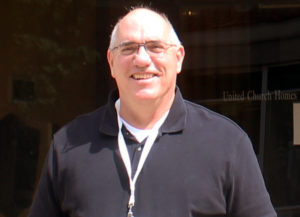COVID-19 Supply Challenges Met, Thanks to Innovative Approach at United Church Homes

Phil Darling, director of United Church Homes’ procurement and supply chain team.
When United Church Homes (UCH) welcomed Phil Darling as its newest director of procurement and supply chain earlier this year, few could have imagined the trajectory of the supply challenges ahead.
Darling joined the team March 16, just days after federal officials announced the closure of all skilled nursing and assisted living communities to nonessential visitors due to the COVID-19 pandemic. Darling got a running start — joining a team he described as dedicated and talented — and hasn’t slowed.
“We take what God gives us and just go along for the ride,” he said. “I wasn’t afraid to ask questions. UCH staff did a great job of explaining the organization’s history and the senior living industry as well as the new challenges we were facing together.”
Darling said he was thankful to join a close-knit team with many new colleagues offering their help on any questions he had. Although the procurement department is small, they have a lot of knowledge between them.
With a long career in purchasing and supply chain management, Darling was already skilled at finding supplies for the best value, based on a combination of cost and quality, while also maintaining consistency. Despite being new to the healthcare industry, in the weeks leading up to the job change, Darling was confident he’d learn quickly.
However, he walked into a new job with an organization significantly impacted by the largest public health crisis in a century. CHHSM member United Church Homes was also experiencing hardship related to stocking essential supplies, such as personal protective equipment, and simultaneous increased expenses and decreased revenue.
“Other than World War II, there has never been anything like this in the lifetimes of the generations living through COVID-19 from a supply chain perspective,” Darling said. “But there are similarities. During the Second World War, factories jumped at the opportunity to accommodate war needs. Who would have thought that Ford Motor Company would ever be manufacturing respirators or that sewing factories would be making cloth masks?”
One of the biggest challenges during this pandemic has been the high demand for supplies that mitigate the risk of infection. This has led to skyrocketing prices for critical PPE, just one of many increased expenses for senior living communities on the front lines of the pandemic.
“If we want PPE – and we need it – we have to pay the current pricing,” Darling said. “The reality is, we’re in no different shape than many major hospitals in New York, Chicago and around the country. We’re all in the same situation — we need masks, and we need them now. We’ve done a good job of finding PPE, and our staff has been fully equipped throughout the pandemic.”
Purchasers must also get creative, Darling said, as they sought sources for three-ply surgical masks, surgical gowns and other supplies. Wait times for supplies have been much longer than anticipated. For example, UCH ordered 50,000 disposable surgical masks from three different companies in mid-March. The anticipated delivery time for each of the orders was two-to-three weeks, but UCH didn’t receive the entire stock for 10 weeks.
“When you realize so many companies need 50,000 masks, from one vendor’s perspective, you actually need millions of them,” Darling said. “Those don’t just materialize the next day. But everyone is in the same boat. Some supplies were not readily available. We’ve had to be patient, which is hard when there are critical needs. But we took it as it came. We never ran out of masks, although we were close.
“We heard of major medical centers in New York City buying garbage bags by the pallet and cutting out holes for healthcare workers’ necks and arms to protect them. We never got to that point, but we need continued advocacy for additional funding for PPE and COVID-19 tests.”
Story by Alissa Paollela; reprinted with permission.
Join Our Mailing LIst
"*" indicates required fields
Follow on Facebook
Bethany Children’s Home Hosts Annual Summer Concert Series with Unique Fundraising Twist - CHHSM
www.chhsm.org
Bethany Children’s Home in Womelsdorf, Pa., is hosting its annual Summer Concert Series, but this time with a special mission in mind: all proceeds will help build a new outdoor recreational complex...